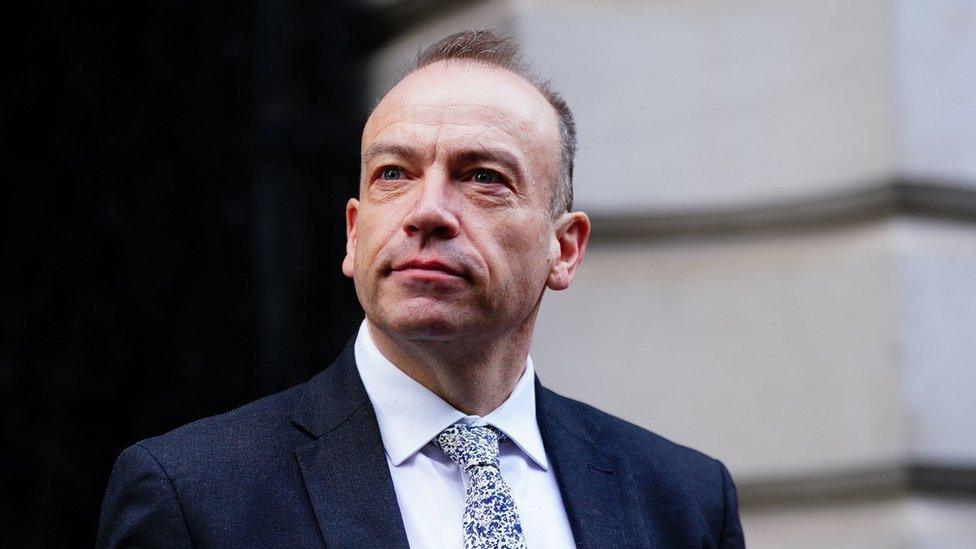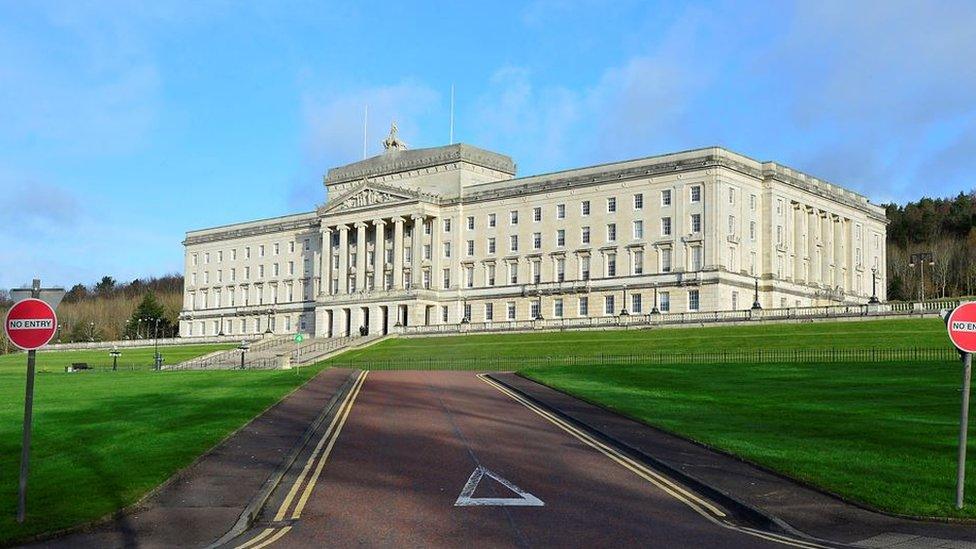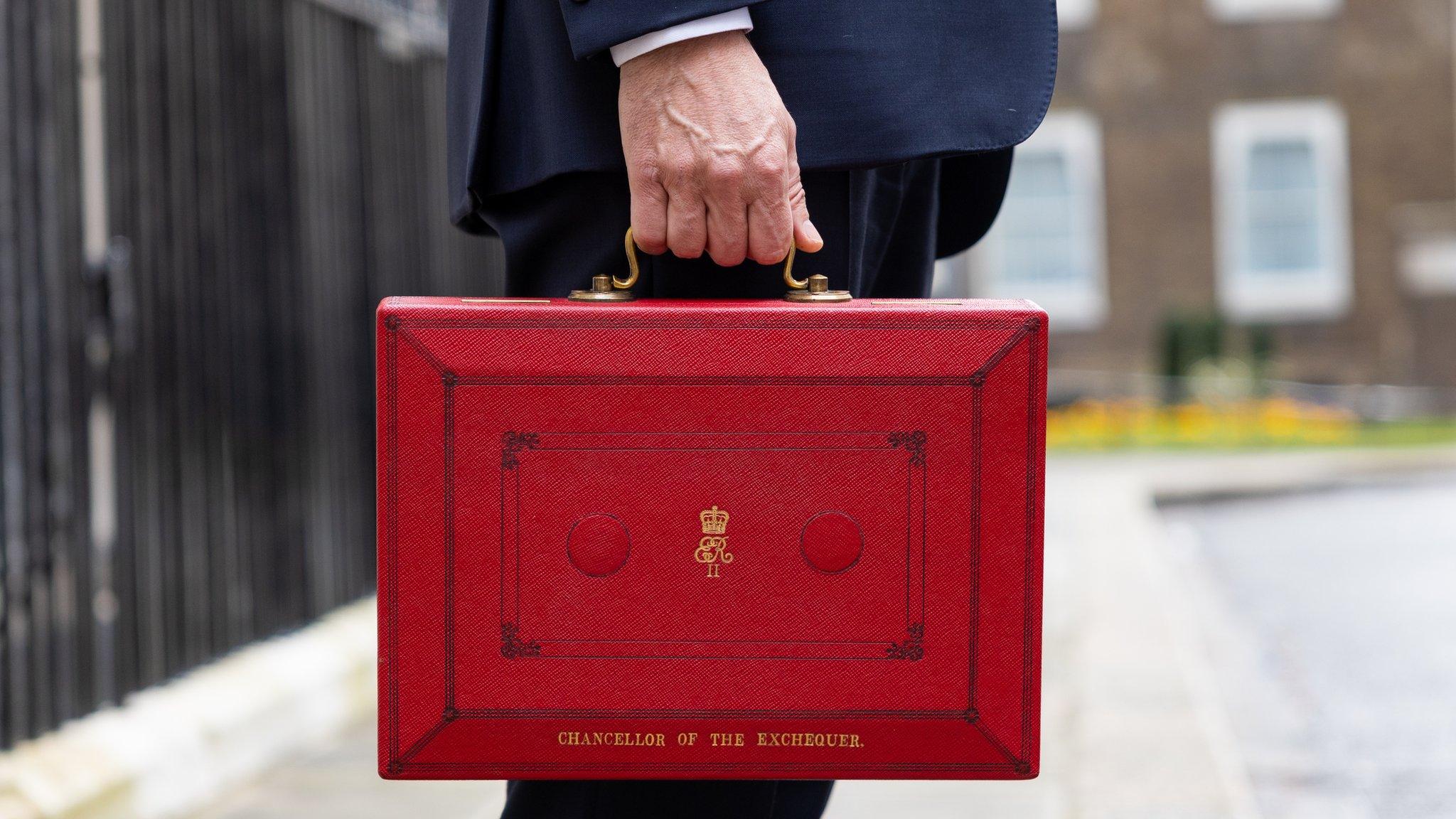Stormont crisis: Budget cuts should be made by ministers - union
- Published

Politicians and not civil servants should make any "exceptionally difficult decisions" on Stormont's public finances, a union representing senior civil servants has said.
Permanent secretaries have been running Stormont departments since October due to the political stalemate at Stormont.
The FDA told the NI secretary they are tasked with "exceptionally difficult decisions" related to the budget.
It added that any cuts should fall on an "accountable, active politician".
A Northern Ireland Office (NIO) spokesperson said restoring the Executive was "the most immediate way of delivering local governance and prosperity".
"The UK government's priority remains to see restored devolved institutions in place to take the decisions and action needed to address the challenges facing Northern Ireland at this time," they added.
Severely limited powers
The Stormont Executive is not functioning due to a boycott by the Democratic Unionist Party (DUP), which is opposed to Northern Ireland's post-Brexit trading arrangements.
However, with none of the nine government department ministers in place, the powers of civil servants are severely limited.
They can only implement policies previously agreed by politicians and their ability to react to changing circumstances is negligible.
Last month, BBC News NI reported that Stormont officials were planning for budget cuts of at least £500m in cash terms.
'Significant and controversial cuts'
In a letter, first reported by the Belfast Telegraph, external, FDA general secretary Dave Penman said no civil servant had accepted their post with the intention of taking decisions "ought properly to be taken by democratically-elected ministers".
"The FDA is aware, from the statements you and local parties in Northern Ireland have made in recent days, that you expect to set an exceptionally challenging budget for Northern Ireland by the end of this week.
"FDA members who are accounting officers, and those who support them, are being tasked by you to implement this challenging budget, requiring exceptionally difficult decisions to be taken which fall far outside the scope of what should be decided by officials operating without the direction and control of a minister."
Allow X content?
This article contains content provided by X. We ask for your permission before anything is loaded, as they may be using cookies and other technologies. You may want to read X’s cookie policy, external and privacy policy, external before accepting. To view this content choose ‘accept and continue’.

The required financial decisions will be "significant and controversial" according to Mr Penman.
He added there is a "serious risk of causing detrimental impacts to the most vulnerable in society in Northern Ireland", including children and those relying on the health service.
Mr Penman asked Mr Heaton-Harris to legislate an amendment to the Northern Ireland (Executive Functions) Act 2022 to empower a Westminster minister to provide ministerial direction to civil service colleagues.
He said this will ensure decisions of a political nature "are taken at the right level, with suitable democratic accountability".

Northern Ireland Secretary Chris Heaton-Harris is likely to make the calls on spending totals for each department
Mr Heaton-Harris has not yet set a Northern Ireland budget for 2023-24 in the absence of an executive at Stormont.
School budgets have been hit already with the Department of Education axing "holiday hunger" payments and certain mental health services.
Northern Ireland Office minister Steve Baker previously said setting Stormont's budget this financial year would be "very, very difficult" and the NI Fiscal Council has warned that Stormont departments are facing large cuts in the new financial year.
In March, the chancellor said his budget will mean an additional £130m for public spending in Northern Ireland over the next two years.
Typically, it would fall to politicians in the power-sharing government at Stormont to decide how any extra cash from the budget is spent.
Stormont stalemate: The civil servants running Northern Ireland
Speaking to BBC News NI, the FDA's general secretary said civil servants feel it "is not appropriate" to be making any financial decisions as they are dealing with "very different territory" at the moment.
"Previously it was business as usual... look at previous decisions, there was a lot of precedent.
"The difference now is the scale of the budget cuts," he said.
Mr Penman added this is "not an ordinary spending round" and that the scale of decision making will be "unprecedented".
"The people of Northern Ireland, they will not know what's about to come in terms of budget cuts."
Mr Penman said the letter, which was sent on Friday, has yet to receive a response from Mr Heaton-Harris.
- Published1 February 2023

- Published15 March 2023

- Published14 November 2022
